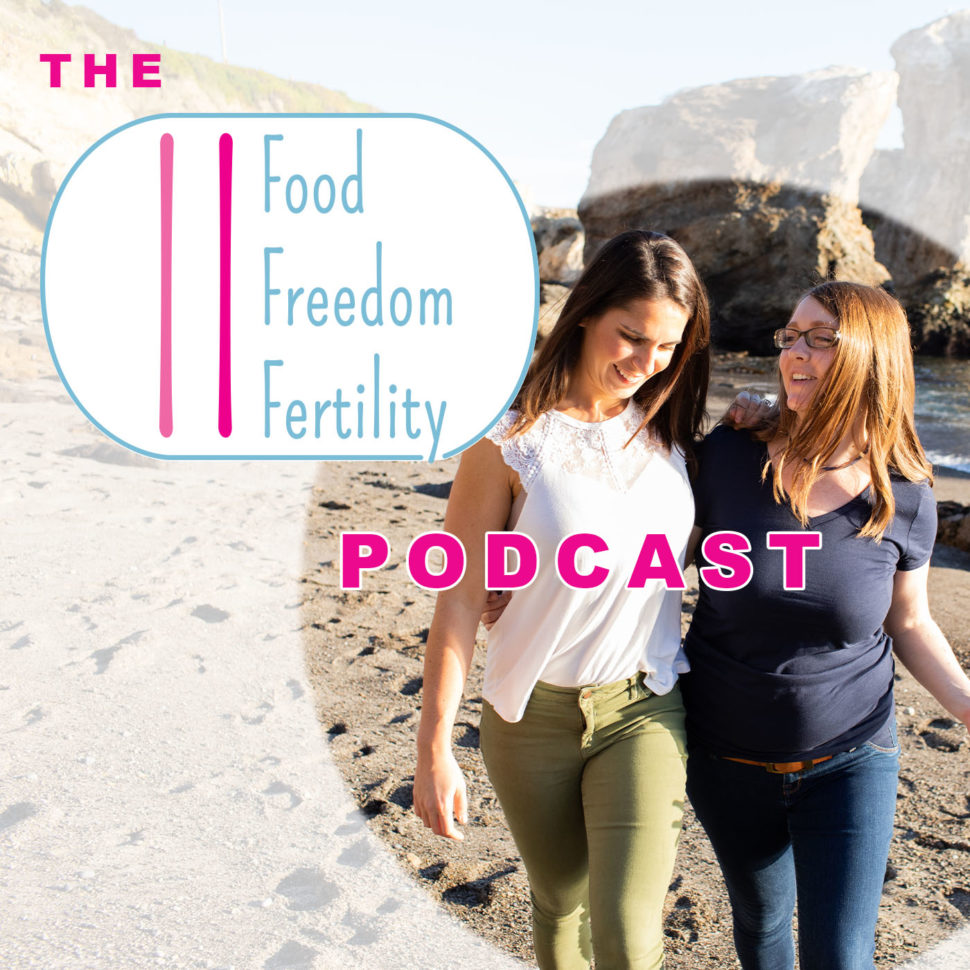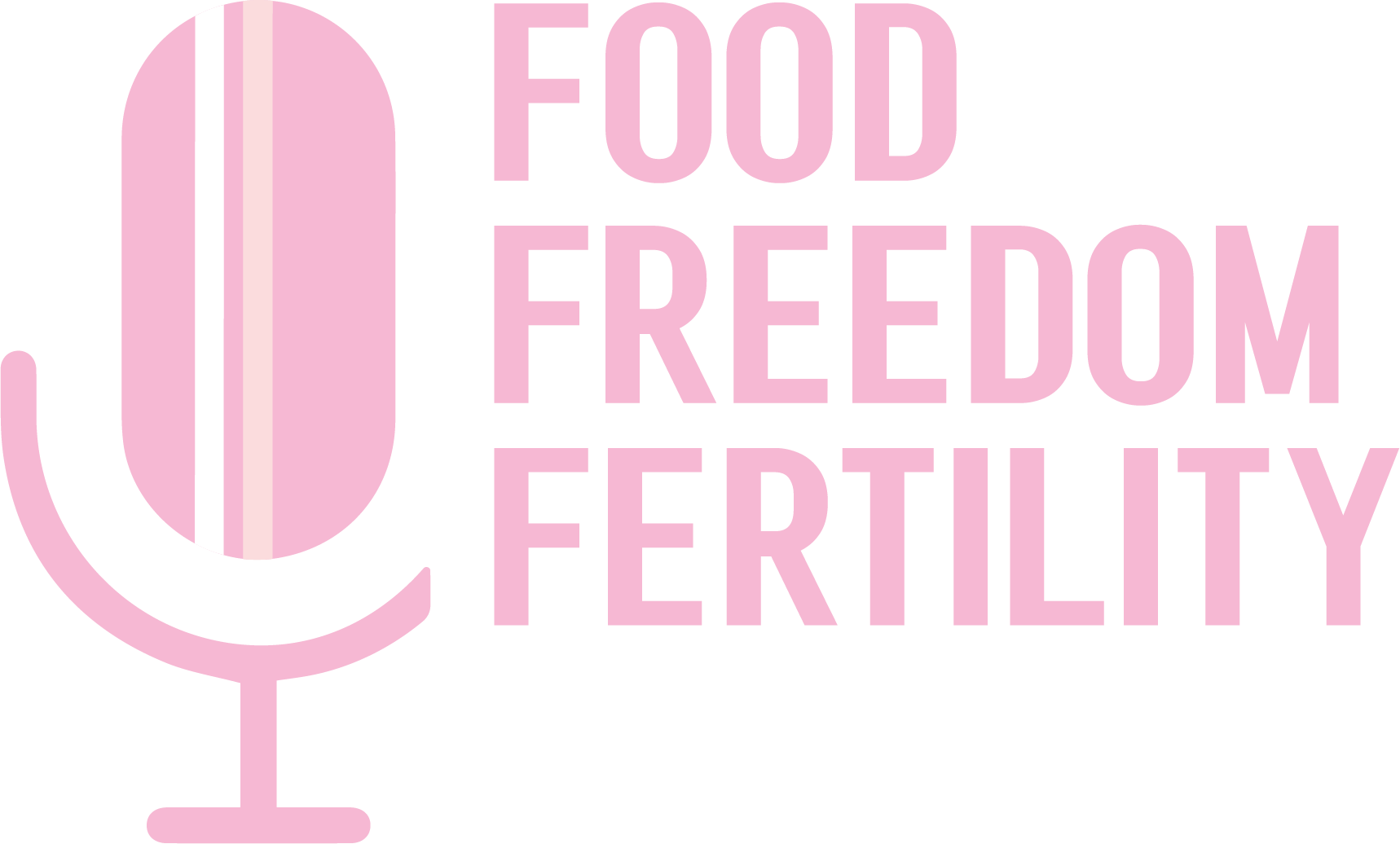Listener Q and A – Your Questions Answered

- Best foods to eat in the two week wait?
- The two week wait (TWW) is the time between a confirmed ovulation and a positive pregnancy test or your period. It’s about 2 weeks long
- If you are changing your diet to make general healthier choices this would be fine.
- This is not a great time to completely switch up your diet and start something new. For example, this is not a good time to go gluten/dairy free because these changes might put you at risk of not getting enough calories as you learn how to eat.
- Changing your diet can also increase your stress, which is detrimental during this period.
- Building a healthy uterine lining:
-
- During this time, the baby isn’t even attached to your body; this is the time when the sperm has met the egg and it is about to attach to the uterus.
- Your job is to help your body build a healthy uterus to eventually feed the baby.
- You need to have a lot of progesterone during this time. The corpus luteum is the follicle that is left over after the egg has been ovulated. This is what begins to produce progesterone.
- Hormone support
- Two major focuses when thinking about nutrition:
- Green leafy vegetables which have a high folate content.
- Pork, red meat, parmesan cheese, broth, parsley
- Foods rich in lysine which helps body build new tissues
- Supports tissue growth, reducing inflammation
- Almonds, pumpkin seeds cashews, walnuts, brazil nuts, flax seeds, chia seeds, sunflower sesame
- Nuts and seeds which have omega-3, selenium and zinc
- If you are exercising, make sure there is enough food energy to support activity so that your body can also put energy towards growing your baby.
- Eat enough for your activity level
- What should I eat during the 2 week wait?
- Should you change your diet drastically?
- What are the top questions to ask your doctor if you haven’t gotten pregnant yet?
-
- Blood work!
-
- Check hormone panel
- These aren’t pregnancy specific but give us a good amount of information about how healthy your body is overall. This can help to make sure you aren’t sick or dealing with an underlying infection that might be preventing pregnancy.
- CBC (complete blood count) and complete metabolic panel
- Thyroid panel is important for someone who is having a hard time getting pregnant, especially if this runs in your family
- Celiac
- Hashimotos
- Tests for underlying autoimmune that might impact ability to get nutrients from their foods. For example:
- Make sure that you know that you are actually ovulating and WHEN you are ovulating to make sure that you are timing your sex appropriately. These are vital pieces of information that can inform how you move forward.
- It’s never too early! But it’s also not too late. You can start at any point getting extra help.
-
- If you start early, you can work on learning about your cycle so that when you are ready to get pregnant you have a head start.
- If you have been trying for a while, there are specific things that you can look at with a specialist to increase your chances. It’s not “too late” to ask for help.
- It’s important to address your reproductive health overall. It shouldn’t be considered “normal” to have painful, debilitating periods for your whole life. It’s not wrong to reach out for help if you know something isn’t right!
- Even if you aren’t ready to have a baby right now or are unsure if you want a baby, you can still get help for current problems in your cycle.
- Think about the type of team you want. Do you want to be on medications and look into surgery or do you want to focus on natural remedies? Both are valid but think through how you want your journey to look and what will align with your priorities.
- If your intuition says that you should see someone- see someone! It can’t hurt to ask for help.
- How long should someone ttc without seeking help? (before going to a doctor to help) / at what point do you recommend seeing a fertility specialist?
- Are there any dietary changes for TTC with hypothyroidism?
- Depends on what is going on with the thyroid. There are a lot of different combinations of hypothyroidism.
-
- Adrenals? under-eating carbs, stress, sleep, etc.
- Hashimotos? Maybe gluten free, high quality meats and broths, gut health
- Are cruciferous veggies OK? Probably not an issue unless you are eating a TON of cruciferous vegetables and this is probably not one of the heavy hitters affecting your thyroid.
- Make SURE you are getting a full thyroid panel in your labs.
- Find a doctor who is “thyroid literate” and knows how to interpret labs, give you the right medications, and support you appropriately.
- Why is it that some women/couples can get pregnant so easily and other women can’t (outside of the standard diagnoses)?
- Check sex timing and sex frequency first and foremost. It’s not really an issue of “more sex” but “well timed sex in relation to your ovulation.”
- Make sure that you’ve had your partner’s semen, blood sugar, testosterone, etc. checked. Causes of subfertility are not only a “female issue.”
- There might be some underlying autoimmune condition or malabsorption disorder (ie digestion). Something else might be up that is not a “common” diagnosis. There is some issue that is preventing easy pregnancy. Keep digging until you have an answer or a pregnancy.
- Consider age. The older we get, the more difficult pregnancy becomes.
- The best thing you can do? Keep advocating for yourself! Keep learning, keep going, keep doing your best.
- How do I lower Testosterone?
-
- Spearmint tea, zinc supplements, peony can all help.
- Most of the testosterone is made in the ovary. Excess insulin causes the ovaries to produce excess testosterone. Balancing blood sugar and eating foods that don’t cause your body to release a lot of insulin will help protect your ovaries from excess insulin and testosterone production.
- Myo-inositol can help here too.
- Consider insulin resistance
- Balanced blood sugar, balanced hormone, nutrient rich diet throughout the holidays. Holidays are stressful already and consistently eating unhealthy foods can further increase stress. Having a big holiday sugar binge might feel good in the moment but it’s going to have a longer term impact that will throw you out of balance.
- Exercise, sleep, get outside for fresh air.
- Don’t overdo it with alcohol. This can really put you in a bad mood, increase anxiety the next day, impact your sleep, and your ability to stay calm. It makes you more susceptible to destructive behaviors and thought processes. Know your limits and don’t over do it.
- Nutrition to support mood with holidays and struggling to conceive?
- What should we do about sugar and “sugar addiction”?
- Inherently, food is food. If you want to consume sugar, you just have to plan for it.
- BUT, it’s not necessarily your fault that you are craving sweets. Our hormones really affect cravings and insulin resistance.
- To address insulin resistance- make sure you have a balanced plate. Include protein at every meal, colorful fruits and veggies, and fiber. Don’t necessarily completely avoid what you are craving (that can cause you to binge on it later) but include it in a balanced meal.
- Breakfast is important! Eat a protein rich, low sugar breakfast. Eating a high sugar breakfast can cause you to crave sugar throughout the day. Even if the foods aren’t high sugar but still have a sweet flavor (like pancakes or sweet protein powders) can make you crave sugar later in the day. A sweet treat with no calories can do the same thing (like artificial sweeteners) and cause your body to want more high sugar foods later to get the calories.
- You may need to eat breakfast earlier so that you aren’t eating so late in the day. Often times people eat breakfast late (around 11am) and then end up eating high sugar foods late in the day. This can build a cycle in which you eat dinner late and then you aren’t hungry until later in the day, etc.
- When you want something sweet, pair it with protein. This can balance your blood sugar and give you the sweet taste that you want.
- See an addiction counselor if you have a true addiction. This can be a psychological and physiological issue that cannot simply be solved with a high protein breakfast.
- Do you recommend the Ava bracelet in PCOS?
- Sophia- recommended for women with PCOS who have shorter (less than 40 days) cycles. Not recommended for really long cycles. This wearable gives you a lot of data that might be helpful to look at.
- Caitlin- All ovulation trackers track your temperature. It doesn’t matter so much what wearable you use as long as you are getting the data. If wearing one around your wrist is going to be more comfortable for you and you will be consistent about wearing it, then this would work for you. The problem is, it might not be very clear based on how it displays the data exactly when you ovulate because it displays so much data- the graph is really small on the app.
- Get the wearable that you are most likely to use consistently!
- If you don’t want to take metformin, what’s the next best thing…
- If you’re taking metformin because you know that your PCOS is due to insulin resistance, there are definitely some things that you can do with your diet and supplements that can help with insulin resistance. Make sure that you are on the right med to address the underlying cause of your PCOS and on the right dose.
-
- Balance your blood sugars with nutrition- increasing protein, fiber, colorful fruits and vegetables, limit sugar and refined carbs
- Move your body to help you become more insulin sensitive. Exercise can help decrease insulin resistance.
- Pro of metformin- your insurance will probably cover it.
- Cons- nutrient deficiency, side effects, pregnancy outcomes impacting baby’s cognitive development and baby’s potential future obesity risk.
- Myoinositol can do very similar things as metformin
- Berberine is very therapeutic for insulin resistance, especially if the person also have fatty liver disease
- N-acetyl cysteine has very similar outcomes as metformin
- Pros of supplements- works the same as metformin with less side effect
- Cons- insurance might not cover it and you will probably have to work with someone to make sure you are getting the right dose.
- Supplement options:




